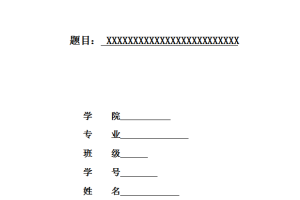新课改和2011年版课程标准均指出,数学教育评价除了关注学生的学习结果,更应注重学生数学思考、问题解决能力的评价,以及学生学习过程的评价,关注学生在数学活动中所表现出的情感态度,注重评价主体的多元化和评价方式的多样化。由此可见,全面、真实、深入地评价学生的学习过程和学习结果,发挥评价的“发展”功能将会是教育评价发展的趋势。形成性评价摒弃了传统的以结果为取向的评价模式,重视对学生学习过程的评价,强调反馈学生的学习情况,从而促进学生的发展,符合当下的评价理念,值得提倡与实践。
本文利用案例分析研究形成性评价的实践,在对国内外形成性评价的研究现状梳理的基础上,阐述了形成性评价的内涵、特点、作用、常用方法等。根据形成性评价的特征,结合学习评价的步骤,对形成性评价的实施步骤详细论述。根据实际操作情况,建立课堂表现、形成性练习、作业与数学日记四方面评价内容。对学生的课堂学习过程有效评价,以提高其课堂学习效率;形成性练习在常规练习题的基础上加入基于任务的练习,既考查了知识的掌握,又可以观察到思考过程;教师、家长双方一同评价作业,督促学生的课后学习;定期撰写数学日记,在记录中形成反思。以具体的案例展现各评价方法的开展,为一线教师提供了操作模板。通过实践过程与结果的分析与反思,归纳总结了形成性评价对教师和学生的价值,提出了有效实施形成性评价的建议,为进一步开发小学数学学习形成性评价提供可操作性的指导意见及实践依据。
本文共分为六个章节,第一章介绍了本文研究的缘起、意义、方法、内容和思路,并对国内外相关文献进行了综述;第二章阐述了本文研究的理论基础;第三章对形成性评价的概念进行了界定,并对其特点、作用和常用方法进行了阐述;第四章论述了形成性评价的具体步骤;第五章以各案例展现了小学数学学习中形成性评价的开展;第六章总结了实践研究中发现的形成性评价的优势和缺点,并提出了在一些建议。
关键词:形成性评价;小学数学学习;实践研究
The new curriculum reform and the 2011 edition of mathematics curriculum standards have pointed out that the evaluation of mathematics education in addition to pay attention to students’ learning results, the evaluation should pay more attention to the students’ mathematical thinking, problem solving, and evaluation of the learning process, which focus on the emotional attitude of students’ performance in math activities, and lay emphasis on the diversification of evaluation subjects and evaluation methods. Thus, how to evaluate students’ learning process and result comprehensively and objectively shows appraisal development function will become the trend of the development of education evaluation. Formative assessment abandons the traditional evaluation model which is oriented by results, and it pays more attention to the evaluation of the students’ learning process, emphasizes the feedback of students’ learning situation. Consequently, it promotes the development of students, which in line with the current concept of evaluation. So it is worth advocating and practicing.
The practice of formative assessment is analyzed by case study. On the basis of combing the research status of formative assessment both here and abroad, the connotation, features, functions and common methods of formative assessment are expounded. According to the characteristics of formative assessment and the steps of learning evaluation, the implementation steps of formative assessment are discussed in detail. In the light of the actual operation, the assessment contents include classroom performance, formative practice, homework and mathematical diary. Effective evaluation of students’ learning process can improve their learning efficiency. On the basis of routine exercises, formative exercises are added into task-based exercises, which not only examine the knowledge but also the thinking process. Teachers and parents evaluate homework together and urge students to study after class. Keeping making math diary offers students the reflection opportunity. This helps them to reflect the problems that they met and what they cannot solve as well as what they are lack during studying math. This paper shows the evaluation methods with specific cases, in order to provide operational templates for frontline teachers. Through analyzing and reflecting of the process and the result, summarizes the value of formative assessment to teachers and students, put forward recommendations for carrying out formative assessment effectively, provide guidance and practical basis for the further development of primary school mathematics formative assessment.
This paper divided into six chapters: The first chapter introduces the research methods of this study, the origin, purpose and significance and function, domestic and foreign literature reviewed is also summarized. The second chapter illustrates the theory. The third chapter defines the concept of formative assessment, and expounds its characteristics, functions and common methods. The fourth chapter discusses the concrete steps of formative assessment. The fifth chapter presents the cases of formative assessment in mathematics learning in primary schools. The sixth chapter summarizes the advantages and disadvantages of formative assessment in practice research, and puts forward some suggestions.
Key Words: Formative assessment; mathematics learning in primary school; practice research
摘要……………………………………………………… I
Abstract…………………………………………………… II
目录…………………………………………………….. IV
第1章 绪论……………………………………………….. 1
1.1 研究缘起……………………………………………… 1
1.1.1 新课程改革对转换评价方式的诉求………………………. 1
1.1.2 小学数学素养培养的需求……………………………… 1
1.1.3 评价存在的问题…………………………………….. 2
1.2 研究意义……………………………………………… 3
1.2.1 理论意义………………………………………….. 3
1.2.2 实践意义………………………………………….. 3
1.3 研究内容……………………………………………… 3
1.4 研究方法……………………………………………… 4
1.5 研究思路…………………………………………….. 4
1.6 国内外研究综述………………………………………… 5
1.6.1 形成性评价的提出…………………………………… 5
1.6.2 国外形成性评价的研究……………………………….. 6
1.6.3 国内形成性评价的研究……………………………….. 7
第2章 形成性评价的理论基础………………………………… 11
2.1 人本主义学习理论……………………………………… 11
2.1.1 人本主义的基本观点………………………………… 11
2.1.2 人本主义对评价的启示………………………………. 11
2.2 建构主义学习理论……………………………………… 11
2.2.1 建构主义的基本观点………………………………… 11
2.2.2 建构主义对评价的启示………………………………. 12
2.3 多元智能理论…………………………………………. 12
2.3.1 多元智能理论的基本观点…………………………….. 13
2.3.2 多元智能理论对评价的启示…………………………… 13
第3章 形成性评价的概述……………………………………. 15
3.1 形成性评价的内涵……………………………………… 15
3.2 形成性评价的特点……………………………………… 16
3.2.1 学习过程…………………………………………. 16
3.2.2 评价内容与目标多维化………………………………. 17
3.2.3 评价主体多元化……………………………………. 17
3.2.4 评价方法多样化……………………………………. 18
3.3 形成性评价的作用……………………………………… 18
3.3.1 增强学生的学习自信心………………………………. 18
3.3.2 促进学生的有效学习………………………………… 19
3.3.3 完善教师的教学……………………………………. 20
3.3.4 培养学生的自我反思习惯…………………………….. 22
3.4 形成性评价的常用方法………………………………….. 22
3.4.1 课堂观察…………………………………………. 22
3.4.2 访谈…………………………………………….. 23
3.4.3 问卷调查…………………………………………. 23
3.4.4 形成性练习……………………………………….. 24
3.4.5 数学日记…………………………………………. 24
3.4.6 成长记录袋……………………………………….. 25
第4章 小学数学形成性评价的步骤…………………………….. 26
4.1 明确评价的主要内容……………………………………. 26
4.1.1 对数学基础知识和基本技能的评价……………………… 26
4.1.2 对数学学习过程与方法的评价…………………………. 27
4.1.3 对数学情感、态度和价值观的评价……………………… 28
4.2 构建评价目标…………………………………………. 28
4.2.1 解读“课标”要求………………………………….. 28
4.2.2 分析教材和学情……………………………………. 29
4.2.3 表述教学目标……………………………………… 29
4.2.4 建立评价目标……………………………………… 30
4.3 确定形成性评价方法……………………………………. 30
4.3.1 课堂表现评价……………………………………… 31
4.3.2 课堂练习评价……………………………………… 32
4.3.3 课后作业评价……………………………………… 33
4.3.4 数学日记的撰写……………………………………. 33
4.4 处理评价信息…………………………………………. 34
4.4.1 数量统计…………………………………………. 35
4.4.2 文字描述…………………………………………. 36
4.5 反馈利用评价结果……………………………………… 36
4.5.1 对于学生的反馈……………………………………. 36
4.5.2 对于教师的反馈……………………………………. 37
第5章 小学数学形成性评价的案例分析…………………………. 38
5.1 课堂评价案例…………………………………………. 38
5.1.1 通过记录表评价……………………………………. 38
5.1.2 课堂即时性评价……………………………………. 42
5.2 课堂练习评价案例……………………………………… 44
5.2.1 基于表现性任务的练习………………………………. 44
5.2.2 常规练习题……………………………………….. 48
5.3 课后作业评价案例……………………………………… 51
5.3.1 家长评价…………………………………………. 51
5.3.2 教师评价…………………………………………. 52
5.4 数学日记评价案例……………………………………… 53
第6章 反思与建议…………………………………………. 55
6.1 形成性评价的优势……………………………………… 55
6.1.1 提升了课堂效率……………………………………. 55
6.1.2 提高了学生学习兴趣………………………………… 55
6.1.3 帮助学生明确学习目标………………………………. 55
6.1.4 促进了教师自我发展………………………………… 56
6.2 形成性评价的缺点……………………………………… 56
6.2.1 费时费力…………………………………………. 56
6.2.2 易受主观干扰……………………………………… 56
6.2.3 对教师要求高……………………………………… 57
6.3 建议………………………………………………… 57
参考文献…………………………………………………. 58





